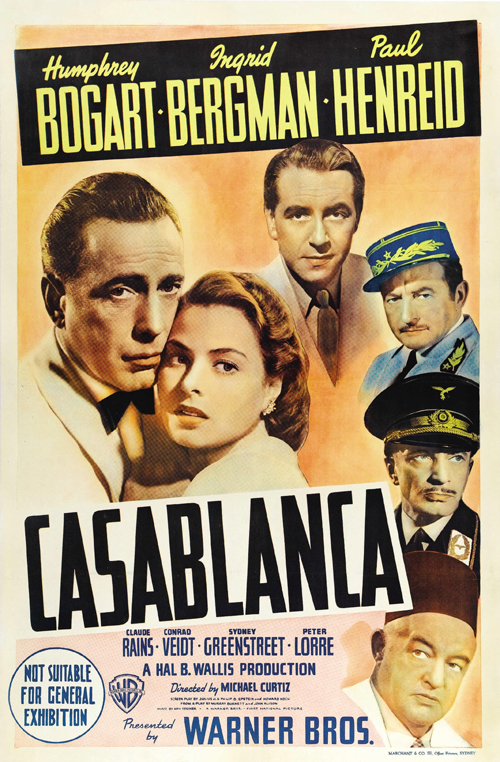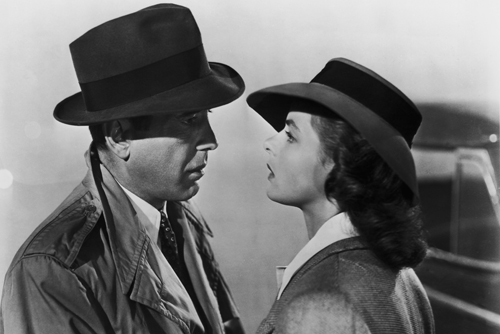
Your complimentary articles
You’ve read one of your four complimentary articles for this month.
You can read four articles free per month. To have complete access to the thousands of philosophy articles on this site, please
Films
Casablanca
Brian McCusker looks and leaps into Casablanca with Søren Kierkegaard.
Although Casablanca (1942) was an A-list film with established stars and first-rate writers, no one involved with its production expected it to be anything other than just one of the hundreds of ordinary pictures produced by Hollywood that year. After all, the premise is fairly straightforward. A cynical world-weary man falls in love with a beautiful woman who restores his faith in humanity, then she leaves him: his belief that life is cruel is confirmed, and he regresses to a selfish existence. The woman reappears, they fall in love again; but this time he leaves her, for the greater good. However, that nutshell contains the essence of many philosophies – not least that of Søren Kierkegaard (1813-1855), the Danish philosopher who many consider to be the father of existentialism. Kierkegaard blasted us with his ideas concerning the dizziness of choice, the authentic individual’s heroic duty to spurn conformity, and the proposal that anxiety is the response to our sense of being free exacerbated by being in confrontation with God.

The major themes in Casablanca are boredom, anxiety, and despair. For Kierkegaard, these are the human psyche’s major problems. People become bored when they’re not being stimulated physically or mentally, but relief from boredom can only be fleeting. Sex, drama, rock concerts, the pub, movies, playing an instrument, and so on, all might provide momentary relief from boredom, but the relief doesn’t last. Boredom is not merely a nuisance, either. Rather, to be psychologically healthy, we must find some way to avert it, at least for most of the time. Anxiety is a result of our responsibility in the face of our freedom of choice. Despair is a result of the tension between the finite and the infinite: humans are frightened of dying, but we’re also frightened of existing forever (Kierkegaard believed that everyone has an immortal soul that lives forever). Boredom and anxiety can be alleviated in various ways, but the only way to escape despair is to have faith in God. However, for Kierkegaard, having faith is more than simply attending church and behaving obediently. Faith requires intense personal commitment and a dedication to unending self-analysis.
Kierkegaard proposed that an individual passes through three stages on the way to becoming a true or authentic self: the Aesthetic, the Ethical, and the Religious. Each of these ‘stages on life’s way’ involve competing views on life. The aesthetic life is defined by pleasure, and to live the aesthetic life to the full one must seek to maximise one’s pleasures. Increasing aesthetic pleasures is one way to combat boredom, although Kierkegaard suggests that the pleasure of events is almost entirely in the anticipation.
Kierkegaard acknowledges the importance of the aesthetic phase, but presents it as an immature stage. The aesthete is only concerned with their personal enjoyment, and because aesthetic pleasure is so fleeting, an aesthete has no solid framework from which to make coherent, consistent choices. Eventually, the pleasures of the aesthetic wear thin, and the seeker of authenticity must begin seeking the ethical life instead. Ethics are the social rules that govern how a person ought to act, and the ethical life offers certain pleasures the aesthetic life cannot. An aesthete can never do something solely for the good of someone else; but we all know that doing things for others without personal motives can be incredibly rewarding and enjoyable.
The character of Rick Blaine in Casablanca – so perfectly portrayed by Humphrey Bogart – could almost have been written by Kierkegaard. At the start of the movie this former freedom fighter has regressed from his ethical stage back into his ultra-cynical ‘I don’t stick my neck out for anyone’ selfish, aesthetic stage. The American expat is now a solitary figure, and owner of the ‘Anglo-Americain Bar’ in WWII Casablanca. It’s a haven for refugees hoping to obtain visas to escape to America.
Rick has led several ‘lives’ up to this point, and has been in control in most of them. He believes that he had learned how to play the absurd life game by inventing rules about how it should be played, fooling himself into believing that the more rules he invents the more he is able to master it. But after Ilsa Laszlo (Ingrid Bergman) re-enters his life, he comes to realise that living by too many rules is the equivalent of living in a strait jacket, whereas the authentic life can include everything of value – love and friendship to name but two. And it’s true: often, the more we try and control life, the more impoverished life becomes: for instance, being afraid to get too close to someone for fear of falling in love and so leaving yourself open to possible rejection. Ilsa refuses to follow such rules, for she needs to pursue authentic existence in depth. Therefore she is prepared to give herself to Rick Blaine – a man with a private past, a precarious present, and no discernible future – despite being married to the virtuous and valiant Victor Laszlo (Paul Henreid), leader of the ‘Great Movement’ against Nazi Germany.
For Kierkegaard ‘the Ethical’ is the second Stage on Life’s Way. As a person matures, the aesthetic life must become subordinated to the ethical, as the ethical life is based not just on individual pleasures, but on a consistent set of rules established for the good of society. The ethical life allows diverse people to coexist in harmony, and causes individuals to act for the good of society. The ethical person considers the effect his or her actions will have on others, and gives more weight to promoting social welfare than to achieving personal gain. When Rick first met Ilsa in Paris, he was himself already well into his ethical stage, having fought the fascists in the Civil War in Spain and having run guns to Ethiopia to help in the fight against the Italian fascists.
The aesthetic life steers one away from consistency, since repetition can lead to boredom. However, an ethical person doesn’t enjoy things simply because they’re novel, but makes ethical choices because of a higher set of principles. Kierkegaard uses marriage as an example of an ethical life choice. In marriage, the excitement of passion can quickly fade, leading to a diminishing of aesthetic pleasure, and so boredom. However, by consistently acting for the good of one’s spouse, one learns that there are pleasures beyond excitement.

“What are the aesthetics of this situation?” “Never mind aesthetics, what are the ethics?” (Lines cut from script’s first draft.)
Images © Warner Bros. 1942
Moving On
Still, the ethical life does little to nurture the spiritual self. The ethical life diverts one from self-exploration since it requires an individual to follow a set of socially-accepted norms and regulations. Yet according to Kierkegaard, self-exploration is necessary for faith, the key requirement for a properly religious, and so mature, life. “Who are you really?” Rick asks Ilsa at one point, as if half expecting to hear that she’s really an angel sent down to restore his faith in humanity. Perhaps he’s not wrong, either, bearing in mind that at the end of the movie she ascends into the ‘heavens’ with the ‘archangel’ Victor to carry on the Great Movement. “Where have you been and what did you do?” he asks her. “We said no questions,” she softly remonstrates. Rick raises his glass and says, “Here’s looking at you kid”, for he realises in that moment that neither the past nor the future have any say on the way he feels here and now. “It’s a crazy world, anything can happen,” she says; “Kiss me as if it were the last time.” And till the end of his days the memory of that kiss, in that moment, will be a part of his sense of the world and of who he is – he will never cease to be someone who was lost until a certain girl smiled at him in a way that let him know she loved him. “We’ll always have Paris,” he tells her: “We lost it, till you came to Casablanca, but last night we got it back.” In Paris, Rick had meaning somewhere on the horizon of his life; the madness and craziness of war was not the vital truth after all. His new-found love and trust was preparation for his next stage of life, the religious. Unfortunately, at this point she seemingly let him down, and he was left standing in the rain at the station.
His suspicions that the world really is unstable and capricious were now fully confirmed. He had dropped his defences, and the life-game kicked him hard where it hurts – in his heart. He’s so traumatised that his spiritual evolution spins into reverse and he regresses to the aesthetic stage – becoming a spectator of life without any commitment or goal, living in the moment and for its fleeting pleasures and satisfactions, open to all adventures, but never making any decisive choices. A chief trait of the aesthetic is moral neutrality, and thus it is bound always to be a stance of disappointment and despair: “I stick my neck out for no one”; “I’m not fighting for anyone anymore except myself. It’s the only cause I’m interested in”; “Rick is completely neutral about everything.” To makes matters worse, Rick also retains the negative aspects of his ethical level, for, marooned in the limbo of the Anglo-Americain Bar, he’s now feeling shame, remorse and self-pity, yet with no plans for change. But then Ilsa comes into his life again. Only this time with her husband.
Rick’s feelings quickly overwhelm him. His repressed emotions pour out of him via a whiskey bottle, while Sam stirs his memories through the piano keys. Deep down Rick wants change, but the prospect of change is always daunting. Ilsa tells him that he’s trying to escape from himself but he’ll never succeed. He says he doesn’t need to help anyone except himself. She says he’s a coward, and her words hit home hard. She points a gun at him, and he tells her to go ahead and shoot. He doesn’t care if he lives or dies; in fact death would be a release from his turmoil. Yet he knows she could never shoot him. Instead she offers herself to him, but he knows that by accepting the offer he would put the Great Movement at risk. This moment is hugely significant, for on this decision the future of the world depends. Suddenly Rick is representative of every individual and the choices they make. He is carrying the universal burden of choice and responsibility. In one giant leap of faith he crosses from the aesthetic to the religious level, and is prepared to give up all the hope of his life. He chooses the love of the Great Movement over individual love: “The problems of three little people don’t amount to more than a hill of beans in this crazy world,” he says.
Just before Victor and Ilsa catch the plane to leave forever, Victor says to Rick, “Welcome back to the fight. God bless you.” The two angels ascend, and Rick walks away into the sunset with Captain Renault. “This could be the start of a beautiful friendship” says Rick, for in this instant the Captain is everyone that the new ‘we found it again’ Rick will meet in the future, instilling his new-found ‘religious’ level of life with beauty.
Ah, what a movie!
© Brian McCusker 2021
Brian McCusker is a writer, presently chipping away at the second draft of a novel based in wartime Germany and 1960’s Britain.









